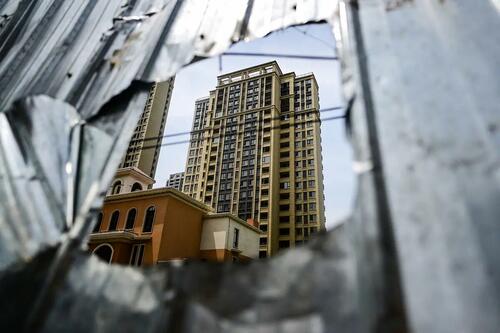Authored by James Gorrie via The Epoch Times (emphasis ours),
As the saying goes, if you want to know what’s really going on, follow the money. That catchphrase doesn’t just apply to foreign companies and investors backing out of China. It also applies to the Chinese economy.

A No-Confidence Vote
In the midst of widespread economic duress and growing social disruption, following the money trail shows how Chinese investors are voting with their wallets.
Consumer spending is down, and the savings rate is up.
Capital is flowing out of China any way it can, and it all amounts to a definite no-confidence vote for Xi Jinping and the Chinese Communist Party (CCP).
The CCP Tries to Hide the Facts
In true CCP fashion, the state puts the blame for its failed policies on those who point them out. Anyone who mentions the crumbling economy, for example, is guilty of creating “financial stability.” Even though the CCP would consider prosecuting journalists and economists who report accurately about the falling employment numbers and the high debt levels that plague local governments, China’s worsening economic conditions are too dramatic and widespread to hide.
Of course, financial stability isn’t threatened by people talking about it. It’s the CCP that’s destroying the economy. Even recent history shows that the less involved the Party is in the economy, the better it performs.
The property market and the development sector are perfect examples, though not the only ones. Both continue to be heavily manipulated by the CCP, and both are hemorrhaging value, as financial ruin in flagship companies such as Evergrande and Country Garden contribute to deteriorating conditions in the wider economy. Completed projects that remain unsold are being demolished, work on existing projects is being halted, and other development plans are being canceled, even as the development companies owe billions to creditors.
More Than a Cyclical Downturn
The reality of what’s happening is starting to dawn on the Chinese. Many understand that the current trend is much more than a cyclical downturn, which is typical of capitalist economies. Growth in the second quarter of 2023 was reported to be only 0.8 percent. Still, that statistic is hardly trustworthy in a country that runs on graft and political favors and routinely fudges the numbers. The reported third-quarter gain of 4.9 percent is touted but not believable, given the real estate collapse, falling consumer spending, and lower exports.
Going forward, as the CCP takes more control, a stagnant economy may be the best-case scenario. Jobs in property development, related industries, and manufacturing sectors are all struggling as foreign companies leave China’s shores.

A Stagnating Middle Class
Meanwhile, individual investors, mostly from the middle class—who put their life savings into properties that aren’t even built and likely won’t ever be built—are seeing their wealth evaporate before their eyes as valuations crater.
This stagnation is primarily due to two factors: internal policies and external ones. Internally, an economy based on graft and corruption rather than one based on market signals—such as the price mechanism that allocates resources and assets where they’re most needed in the economy—can’t sustain itself. Thus, turning profitable private enterprises into debt-ridden state-owned enterprises, which is a euphemism for confiscation by the CCP, has destroyed entrepreneurship—the economic engine of China.
Add to that the CCP’s fundamental shift from economic growth to internal security and stability. It’s a vicious cycle wherein more Party control results in less economic activity, financial duress, and civil discontent. The Party then doubles down on more state control and more oppression.
In short, the Party is more concerned with maintaining its grip on power than it is with growing the economy or supporting the middle class.
Companies Are Fleeing 'Uninvestible' China
But there are external factors, or consequences, as well.
Over the past year, the flight of Western manufacturers out of China has accelerated. American and European firms are seeing the writing on the wall. They see the world’s growing disenchantment with Beijing’s trade and foreign policies, with many anticipating a decline in economic stability and a greater degree of decoupling from China in the foreseeable future. As a result, they’re relocating their operations out of China to friendlier nations.
'Friendshoring' Making Things Worse
This trend is known as “friendshoring.” In essence, countries such as Vietnam, Indonesia, India, and Mexico are capturing companies exiting China. They offer less political risk, friendlier trade policies, lower labor costs, and are closer to markets. Barring any major shifts in Chinese leadership, companies leaving China are unlikely to return, which is a growing economic and financial gap for the CCP to fill.
Youth Unemployment Rate at Record High

Other symptoms of the collapse are evident, such as the soaring unemployment rate for young people. It is now a reported 20 percent, but counting those who live with their parents for financial reasons, it’s likely approaching 50 percent. Underemployment makes that picture even worse, which is leading to an angry younger generation. Disaffected youth who see no good options for a better future can be a volatile force to reckon with.
The Race to Exit Chinese Real Estate
All of these reasons and others are why some wealthy Chinese have been selling their China properties as quickly as they can. They’re desperately trying to move their money out of China and invest abroad before the value of their Chinese real estate holdings loses even more value. They know the trajectory of the Chinese economy and want out.
Many are buying real estate in Japan.
It's not just proximity attracting Chinese investors to Japanese real estate, although that is a significant factor. Another enticement is that owning real estate (or a profitable business) in Japan can lead to long-term or even permanent residency visas. That gives Chinese investors an easy way out of the country to avoid the coming meltdown, as well as avoiding the iron hand of the CCP.
The “China miracle” is no more.
Views expressed in this article are opinions of the author and do not necessarily reflect the views of The Epoch Times or ZeroHedge.